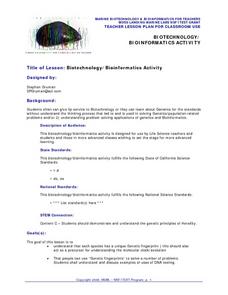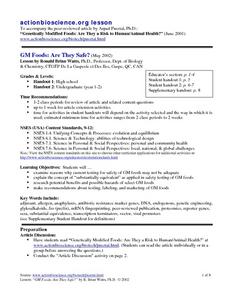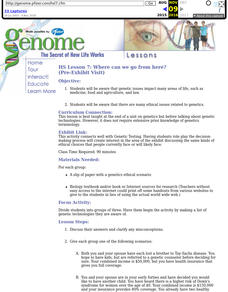Curated OER
Are You Susceptible?
Students play a game to explore the relationship between genetic variation and environmental factors in the onset of heart disease. They consider the implications for disease prevention of increased knowledge about genetic variation.
Zebrafish in the Classroom
Mini‐Experiment with GloFish: Learning the Scientific Methods
If you need a way to reinforce the scientific method in your elementary classroom, use a science experiment about GloFish. The resource includes several pages of worksheets that guide learners through making a hypothesis, testing their...
Curated OER
Biotechnology/Bioinformatics Activity
Students demonstrate the genetic principles of Heredity. They discover that each species has a unique Genetic fingerprint and that people can use "Genetic fingerprints" to solve a number of problems. They discuss examples of uses of DNA...
Virginia Department of Education
Building a DNA Model
It has been decades since the discovery of DNA. Still, activities such building this DNA model allow blossoming scientists to better understand the components that form this overall structure. During this activity, they will also...
Virginia Department of Education
Owl Family Natural Selection
How do genetic mutations within a population lead to future variations? Provide your class with the resources to answer this question and more upon completing an activity on natural selection. The entire class participates in a...
College Board
2014 AP® Biology Free-Response Questions
The most popular AP science exam, Biology, also maintains the highest passing rate. The College Board releases old test questions covering trichomes and much more, along with statistics and scoring guidelines to help scholars study for...
University of Minnesota
Dendritic Spines Lab
This is your brain on drugs ... literally! Your neuroscientists-in-training examine the evidence of drug use on the human brain and how neurons change their connectivity when altered by drugs. They then work together to create testing...
Towson University
Mystery of the Crooked Cell
Can your class solve the Mystery of the Crooked Cell? Junior geneticists collaborate to learn about sickle cell anemia in a fascinating lesson plan. The included materials help them to examine the genetic factors behind the disease...
Curated OER
Ethical and Personal Decisions
Young scholars will learn about the current technology of genetic testing within the
framework of the biology curriculum through a lesson-produced PowerPoint presentation: "Genetic Testing" at: http://jbois.tripod.com/index.html.
Serendip
UV, Mutations, and DNA Repair
How effective are cells at repairing UV damage? An inquiry-based lesson has learners experiment with organism by exposing them to various levels of UV light and then examining their DNA after a period of time. Pupils test different...
Curated OER
RFLP Paternity Testing: A Simulation
Students use simulated autorads to discover the principle utilized to determine paternity.
Howard Hughes Medical Institute
Got Lactase? Blood Glucose Data Analysis
Many physicals include a blood glucose test, but what are doctors actually testing? Scholars graph and interpret blood glucose data, allowing them to observe the differences in lactase persistence and draw conclusions. They then connect...
Curated OER
Lesson 10: Karyotypes
Students predict traits of future offspring. In this biology lesson, students study karyotyping to predict genetic disorders. They research an assigned karyotype and present information about it.
Learning Games Lab
Nitrogen in Pollutants
Responsible farming is important for maintaining natural resources. Eager scientists complete a WebQuest to explore what happens to nitrogen when it enters the soil. They learn about the chemical makeup of nitrogen-based molecules...
Serendip
Is Yeast Alive?
Through two investigations, life science learners determine whether or not yeast is alive. They perform tests for metabolism by providing sugar and observing if gas is produced as a byproduct. They incubate some of the sample for at...
Curated OER
Who Took Jerell's iPod? ~ An Organic Compound Mystery
Within the setting of a crime scene investigation, biochemistry beginners analyze organic compounds as a means of determining "Who dunnit." They use a brown paper test for lipids, glucose test strips and iodine to identify carbohydrates,...
Curated OER
Using Blood Tests to Identify Babies and Criminals
Students solve a crime by matching a suspect's blood type to physical evidence collected at the crime scene. In this forensic science lesson, students identify the different blood types. They explain how blood tests work.
Curated OER
Biotechnology
Young scholars are introduced to the topic of biotechnology. Using the internet, they research issues that have been improved or brought about because of biotechnology advancements. In groups, they participate in activities in which...
Virginia Department of Education
Biotechnological Issues and Bioethics
Culminate a bioethics unit with the implementation of a lesson that incorporates the Socratic method to encourage class feedback and participation. Pupils participate in a discussion on bioethics and morality, complete a...
Curated OER
Geneticist for a Day
Students discuss and compose a document discussing the transmission of the Huntington's gene- dominant or recessive, sex linked, etc. Additionally, they ought to consider Dr. Wexler's own odds for contracting the disease.
Curated OER
Genetic Counseling
Students apply the principles of ethical decision making to actual cases. They appreciate that there is usually no one "right" decision. Students compare their conclusions to those of individuals who are in the field.
Curated OER
GM Foods: Are They Safe?
Students examine the process for testing GM foods. They research benefits and hazards of a selection of GM foods. They also create images of new labels and marketing for GM foods.
Curated OER
Population Study and Applications Using PTC Paper
Students study human population traits. In this science lesson plan, students gain an understanding of the terms dominant, recessive, haploid (monoploid), diploid, genotype, phenotype, scientific sampling, and scientific modeling as they...
Curated OER
Genome: The Secret of How Life Works
Students become aware that genetic issues impact many areas of life, such as medicine, food and agriculture, and law. They become aware that there are many ethical issues related to genetics.

























